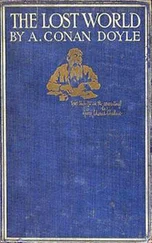Arthur Conan Doyle - The Refugees
Здесь есть возможность читать онлайн «Arthur Conan Doyle - The Refugees» весь текст электронной книги совершенно бесплатно (целиком полную версию без сокращений). В некоторых случаях можно слушать аудио, скачать через торрент в формате fb2 и присутствует краткое содержание. Издательство: Array Иностранный паблик, Жанр: foreign_prose, на английском языке. Описание произведения, (предисловие) а так же отзывы посетителей доступны на портале библиотеки ЛибКат.
- Название:The Refugees
- Автор:
- Издательство:Array Иностранный паблик
- Жанр:
- Год:неизвестен
- ISBN:нет данных
- Рейтинг книги:3 / 5. Голосов: 1
-
Избранное:Добавить в избранное
- Отзывы:
-
Ваша оценка:
- 60
- 1
- 2
- 3
- 4
- 5
The Refugees: краткое содержание, описание и аннотация
Предлагаем к чтению аннотацию, описание, краткое содержание или предисловие (зависит от того, что написал сам автор книги «The Refugees»). Если вы не нашли необходимую информацию о книге — напишите в комментариях, мы постараемся отыскать её.
The Refugees — читать онлайн бесплатно полную книгу (весь текст) целиком
Ниже представлен текст книги, разбитый по страницам. Система сохранения места последней прочитанной страницы, позволяет с удобством читать онлайн бесплатно книгу «The Refugees», без необходимости каждый раз заново искать на чём Вы остановились. Поставьте закладку, и сможете в любой момент перейти на страницу, на которой закончили чтение.
Интервал:
Закладка:
"Ay, sink or swim," cried old Ephraim with enthusiasm.
"Nay, upon the bank."
"And have him maybe in front of us warning the black jackets."
"On that island, then."
"Very good. He can hail the first of his folk who pass."
They shot over to the island and landed the friar, who said nothing, but cursed them with his eye. They left with him a small supply of biscuit and of flour to last him until he should be picked up. Then, having passed a bend in the river, they ran their canoe ashore in a little cove where the whortleberry and cranberry bushes grew right down to the water's edge, and the sward was bright with the white euphorbia, the blue gentian, and the purple balm. There they laid out their small stock of provisions, and ate a hearty breakfast while discussing what their plans should be for the future.
Chapter XXX. The inland waters
They were not badly provided for their journey. The captain of the Gloucester brig in which the Americans had started from Quebec knew Ephraim Savage well, as who did not upon the New England coast? He had accepted his bill therefore at three months' date, at as high a rate of interest as he could screw out of him, and he had let him have in return three excellent guns, a good supply of ammunition, and enough money to provide for all his wants. In this way he had hired the canoe and the Indians, and had fitted her with meat and biscuit to last them for ten days at the least.
"It's like the breath of life to me to feel the heft of a gun and to smell the trees round me," said Amos. "Why, it cannot be more than a hundred leagues from here to Albany or Schenectady, right through the forest."
"Ay, lad, but how is the gal to walk a hundred leagues through a forest? No, no, let us keep water under our keel, and lean on the Lord."
"Then there is only one way for it. We must make the Richelieu River, and keep right along to Lake Champlain and Lake St. Sacrament. There we should be close by the headwaters of the Hudson."
"It is a dangerous road," said De Catinat, who understood the conversation of his companions, even when he was unable to join in it. "We should need to skirt the country of the Mohawks."
"It's the only way, I guess. It's that or nothing."
"And I have a friend upon the Richelieu River who, I am sure, would help us on our way," said De Catinat with a smile. "Adele, you have heard me talk of Charles de la Noue, seigneur de Sainte Marie?"
"He whom you used to call the Canadian duke, Amory?"
"Precisely. His seigneury lies on the Richelieu, a little south of Fort St. Louis, and I am sure that he would speed us upon our way."
"Good!" cried Amos. "If we have a friend there we shall do well. That clenches it then, and we shall hold fast by the river. Let's get to our paddles then, for that friar will make mischief for us if he can."
And so for a long week the little party toiled up the great waterway, keeping ever to the southern bank, where there were fewer clearings. On both sides of the stream the woods were thick, but every here and there they would curve away, and a narrow strip of cultivated land would skirt the bank, with the yellow stubble to mark where the wheat had grown. Adele looked with interest at the wooden houses with their jutting stories and quaint gable-ends, at the solid, stone-built manor-houses of the seigneurs, and at the mills in every hamlet, which served the double purpose of grinding flour and of a loop-holed place of retreat in case of attack. Horrible experience had taught the Canadians what the English settlers had yet to learn, that in a land of savages it is a folly to place isolated farmhouses in the centre of their own fields. The clearings then radiated out from the villages, and every cottage was built with an eye to the military necessities of the whole, so that the defence might make a stand at all points, and might finally centre upon the stone manor-house and the mill. Now at every bluff and hill near the villages might be seen the gleam of the muskets of the watchers, for it was known that the scalping parties of the Five Nations were out, and none could tell where the blow would fall, save that it must come where they were least prepared to meet it.
Indeed, at every step in this country, whether the traveller were on the St. Lawrence, or west upon the lakes, or down upon the banks of the Mississippi, or south in the country of the Cherokees and of the Creeks, he would still find the inhabitants in the same state of dreadful expectancy, and from the same cause. The Iroquois, as they were named by the French, or the Five Nations as they called themselves, hung like a cloud over the whole great continent. Their confederation was a natural one, for they were of the same stock and spoke the same language, and all attempts to separate them had been in vain. Mohawks, Cayugas, Onondagas, Oneidas, and Senecas were each proud of their own totems and their own chiefs, but in war they were Iroquois, and the enemy of one was the enemy of all. Their numbers were small, for they were never able to put two thousand warriors in the field, and their country was limited, for their villages were scattered over the tract which lies between Lake Champlain and Lake Ontario. But they were united, they were cunning, they were desperately brave, and they were fiercely aggressive and energetic. Holding a central position, they struck out upon each side in turn, never content with simply defeating an adversary, but absolutely annihilating and destroying him, while holding all the others in check by their diplomacy. War was their business, and cruelty their amusement. One by one they had turned their arms against the various nations, until, for a space of over a thousand square miles, none existed save by sufferance. They had swept away Hurons and Huron missions in one fearful massacre. They had destroyed the tribes of the north-west, until even the distant Sacs and Foxes trembled at their name. They had scoured the whole country to westward until their scalping parties had come into touch with their kinsmen the Sioux, who were lords of the great plains, even as they were of the great forests. The New England Indians in the east, and the Shawnees and Delawares farther south, paid tribute to them, and the terror of their arms had extended over the borders of Maryland and Virginia. Never, perhaps, in the world's history has so small a body of men dominated so large a district and for so long a time.
For half a century these tribes had nursed a grudge wards the French since Champlain and some of his followers had taken part with their enemies against them. During all these years they had brooded in their forest villages, flashing out now and again in some border outrage, but waiting for the most part until their chance should come. And now it seemed to them that it had come. They had destroyed all the tribes who might have allied themselves with the white men. They had isolated them. They had supplied themselves with good guns and plenty of ammunition from the Dutch and English of New York. The long thin line of French settlements lay naked before them. They were gathered in the woods, like hounds in leash, waiting for the orders of their chiefs, which should precipitate them with torch and with tomahawk upon the belt of villages.
Such was the situation as the little party of refugees paddled along the bank of the river, seeking the only path which could lead them to peace and to freedom. Yet it was, as they well knew, a dangerous road to follow. All down the Richelieu River were the outposts and blockhouses of the French, for when the feudal system was grafted upon Canada the various seigneurs or native noblesse were assigned their estates in the positions which would be of most benefit to the settlement. Each seigneur with his tenants under him, trained as they were in the use of arms, formed a military force exactly as they had done in the middle ages, the farmer holding his fief upon condition that he mustered when called upon to do so. Hence the old officers of the regiment of Carignan, and the more hardy of the settlers, had been placed along the line of the Richelieu, which runs at right angles to the St. Lawrence towards the Mohawk country. The blockhouses themselves might hold their own, but to the little party who had to travel down from one to the other the situation was full of deadly peril. It was true that the Iroquois were not at war with the English, but they would discriminate little when on the warpath, and the Americans, even had they wished to do so, could not separate their fate from that of their two French companions.
Читать дальшеИнтервал:
Закладка:
Похожие книги на «The Refugees»
Представляем Вашему вниманию похожие книги на «The Refugees» списком для выбора. Мы отобрали схожую по названию и смыслу литературу в надежде предоставить читателям больше вариантов отыскать новые, интересные, ещё непрочитанные произведения.
Обсуждение, отзывы о книге «The Refugees» и просто собственные мнения читателей. Оставьте ваши комментарии, напишите, что Вы думаете о произведении, его смысле или главных героях. Укажите что конкретно понравилось, а что нет, и почему Вы так считаете.












